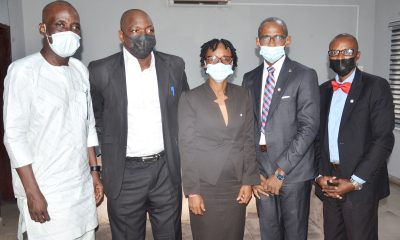News
WMD: ‘Nigeria Accounts For 24% Of Malaria Deaths Globally’

The Commissioner for Health in Ogun State, Dr. Tomi Coker, has declared that Nigeria accounts for about 24 per cent of malaria deaths globally.
Coker, who disclosed this while addressing newsmen in commemoration of 2021 World Malaria Day (WMD) held at the Ministry of Health conference room, Okemosan, Abeokuta, said malaria was a disease that is preventable, treatable and curable.
The government also said the intervention will be in the area of distribution of free Long Lasting Insecticidal Nets (LLINs) to pregnant women at first booking and children under five years who complete immunization schedules in all public health facilities.
Coker, who was represented at the briefing by the Permanent Secretary in the ministry, Dr A. E. Ayinde, said the World Malaria Day was set aside to mobilize the global community and resources towards providing education and understanding on malaria scourge.
“ The Africa region still bears 90 per cent of the global malaria burden and 91 per cent of malaria deaths worldwide. Nigeria, the most populous country in Africa accounts for about 27 per cent of this burden and 24 per cent of Malaria deaths globally.
“In Nigeria, malaria is responsible for approximately 60 per cent of out-patient visits and 30 per cent of hospital admission. It contributes up to 11 per cent of maternal mortality, 25 per cent of infant mortality and 30 per cent of under five mortality. It is estimated that about 110 million cases are clinically diagnosed annually.
“Malaria creates additional burden on the already weakened health system and accounts for about N480billion in out-of-pocket expenses for treatment, prevention and man hours loss; it thus exerts a severe social and economic burden on the nation and households”.
The commissioner, who explained that the theme for 2021 World Malaria Day is, “Zero Malaria – Draw the line against Malaria” with the slogan “Stand up – Take action”, said the “theme makes the message more personal and emphasises need for communities and individuals to take ownership of malaria prevention more seriously.
“This year’s commemoration will build on the ‘Zero Malaria starts with me’ movement and the ‘Draw the line against Malaria’ youth-focused campaign. It is an opportunity to encourage and promote multi-sectoral collaboration as well as youth involvement in malaria elimination.
“This requires technical focus and sustained funding by the government, the private sectors and household resources.
“The Government of Ogun State is working with her partners to ensure that proven interventions are deployed towards malaria elimination; these include: Distribution of free Long Lasting Insecticidal Nets (LLINs) to pregnant women at first booking and children under five years who complete immunization schedules in all public health facilities.
“It is pertinent to note that the state has also started the process of LLIN replacement campaign aimed at distributing 3.7million nets to every household. The household mobilization and distribution process to all households is planned for July, 2021.
“We also continue free testing and treatment with Artemisinin-based Combination Therapy (ACTs) in all the primary health facilities in Ogun State. In 2020, out of the 311,668 fever cases tested, 255,872 were positive for malaria and 99.5 per cent of those positive were treated free with ACTs.
“The severe malaria cases are managed with Artesunate injection in secondary and tertiary health facilities. The free testing and treatment with ACTs is also extended to identified schools with School Health Workers. These schools are linked to close primary health centres for supply of RDT kits and ACTs to treat students in school.
“This gives opportunity of prompt treatment to students which prevents advancement to severe cases and reduces absenteeism. Also, Behavioural Change Communication (BCC) activities (such as drama, Interpersonal communication, net hanging demonstrations, role play in communities) are being scaled up with support from our partners.
“Capacity building programmes on malaria for all relevant health professionals and regular monitoring and supervision are carried out regularly to ensure standards. As part the effort of His Excellency to reduce infant and maternal mortality and increase life expectancy for the general populace of the state, the administration of Prince Dapo Abiodun has commenced renovation of 236 Primary Health Care facilities with 42 already completed.
“The slogan ‘Stand up – Take action’ is a call to action to everyone to take a stand and carry out specific roles. Individuals and communities are encouraged to undertake regular clearing of bushes, drainages and receptacles that serve as breeding sites for mosquitoes. Ensure every member of their households, especially pregnant women and children sleep inside Insecticide Treated Nets.
“You should also take advantage of the free malaria test and treatment available in our public facilities whenever you have fever or other symptoms. Our traditional and community leaders are to sensitize their communities on clean environment and promote same to make sure their environments are rid of breeding sites for disease-borne vectors.
“Our religious leaders should include key messages on malaria prevention in their sermons and preaching. Media houses are enjoined to support awareness creation and promote malaria prevention through various mass media platforms. In conclusion, we will not relent on our efforts, as every step brings us closer to the goal of ending malaria”.
News
Bonny-Bodo Road: FG Offers Additional N20bn, Targets December Deadline

The Federal Government has agreed to offer additional N20.5 billion for the completion of the Bonny-Bodo road project in December.
The government, however, said if the construction company, Julius Berger, was not ready to accept the offer, the contract will be terminated.
Minister of Works, David Umahi, said this during a meeting with the Managing Director of Julius Berger, Lars Ritcher and members of Bodo-Bonny Road Peace Committee, on Wednesday in Abuja.
The reports that Julius Berger had requested asking for a N28 billion variation on the 82 per cent completed project.
The company hinged its request on the rise in exchange rate, construction materials, and diesel among others.
Umahi, however, said the government was willing to provide N20 billion out of the N28 billion that Julius Berger requested for.
According to him, the Bonny-Bodo road contract which was initially awarded at the cost of N120 billion in 2015, was later varied at N199 billion with a completion dateline of December 2023, which has since elapsed.
The Tide’s source recalls that in 2017, an agreement between the Federal Government, Nigeria Liquefied Natural Gas (NLNG) and Julus Berger on modalities for funding the project cost of N199.923 billion, without any further increase.
“If you do not accept the Federal Government’s offer by Friday and resume work on the site, the previously expired 14-day ultimatum for termination of project will be enforced.
“I want to let you know that we are the client. No contractor will dictate for this ministry, and there is no job that is compulsory that a particular contractor must do.
“We give you an offer. If you do not like the offer, you walk away. You don’t force us or we don’t force you.
“Agreement of contractual relationship is a mutual understanding,’’ the minister said.
Umahi said that had Julius Berger adhered to the project timetable, the project would have been completed on schedule before the impact of foreign exchange.
“Our position is very simple, we reject the conditions of Julius Berger totally and we ask Berger to please go back to the site to complete the project based on our offer.
“Our offer is unconditional and we say, accept or reject, so you cannot subject our offer to your conditions ,’’ he added
Umahi said the company should be humble in its dealings and exhibit solidarity during challenges.
Earlier, Richter had explained that the company suspended work on the site to seek some clarifications from the ministry.
According to him, the company asked for the augmemtation of N28 bilion because as at the time the contract was awarded the exchange rate was N305 to a dollar and diesel was N350 eor litre.
“We will still require some outstanding materials; that means that the initial agreement can’t fly because the variation of project is not sufficient and the exchange rate is also not in our favour to compensate the additional costs.
“That is why we decided to go back to our original proposal of the augmentation. Augmentation is a very normal process for all contracts,” the managing director said.
Chief Abel Attoni, Palace Secretary, Bonny Kingdom, expressed gratitude to President Bola Ahmed Tinubu over the decision to complete the Bodo-Bonny road project.
Attonu urged the parties to be patriotic and make the necessary sacrifice for the actualisation of the project.
News
Court Vacates Arrest Warrant Against Ehie, Five Others

The Federal High Court, sitting in Abuja, yesterday, set aside the warrant of arrest against Rt. Hon. Edison Ehie, the Chief of Staff, Government House, Rivers State, and five others.
Justice Emeka Nwite stated this while delivering his ruling in an application seeking to vacate the warrant of arrest which he issued on January 31, 2024.
The Judge said he was misled by the police in ordering the arrest of Ehie in connection with the burning of the Rivers State House of Assembly on October 30, 2023.
The Police, had told the court that Ehie and five others masterminded the bombing of the Rivers State House of Assembly amid a plot to impeach Rivers State Governor, Siminalayi Fubara.
The five others are Jinjiri Bala, Happy Benedict, Progress Joseph, Adokiye Oyagiri, and Chibuike Peter, alias Rambo.
Justice Emeka Nwite while setting aside the warrant said it has now become a mere academic exercise.
The judge further granted same to the 2nd to 5th Defendant/Applicant in same suit.
Femi Falana, SAN, and Oluwole Aladedoye, SAN, who appeared for the defendants in separate suits, held that the court lacked the jurisdiction to have granted the order.
While Falana filed a motion seeking an order to set aside the January 31 order by Justice Nwite, Aladedoye applied for a stay of execution of the arrest order.
In a motion marked: FHC/ABJ/CS/112/2024 dated February 2 and filed on February 7 by Falana, Ehie sought two orders, including “an order setting aside the order made on January 31 for want of jurisdiction.
“An order of this honourable court staying the execution of the order made on the 31st January 2024, pending the hearing and determination of this application.”
Giving six grounds of argument, Falana argued that the complainant had not filed any criminal charge or motion before the court.
The senior lawyer argued that the court lacked the territorial jurisdiction to entertain the ex-parte application as the alleged offences of conspiracy, attempted murder, murder and arson took place in Port Harcourt, the state capital.
“He submitted that the court lacked the vires to grant an application to arrest and declare his clients wanted in respect of the alleged offences.
“The complainant/respondent (IG) did not adduce evidence of terrorism in the affidavit in support of the application.
“The complainant/respondent did not cite any section of the Terrorism Prevention Act, 2013 (as amended) alleged to have been contravened by the applicants,” he argued.
Aladedoye in a motion on notice dated and filed February 9, on behalf of the five defendants, sought two orders, including
“an order staying execution or further execution of the order(s) of this honourable court made on the 31st of January, 2024, pending the hearing and determination of the appeal filed by the applicants.
“An order of injunction restraining the complainant from carrying out or further carrying out the orders of this honourable court made on the 31st January 2024, pending the hearing and determination of the appeal filed by the applicant in this case.”
Giving a three-ground argument, Aladedoye said that a notice of appeal had already been filed against Justice Nwite’s orders.
According to the senior lawyer, the notice of appeal contains grounds that challenge the jurisdiction of the honourable court.
The Inspector-General had, in a charge marked: FHC/ABJ/CR/25/2024, arraigned the defendants on a seven-count criminal charge bordering on terrorism and murder.
News
13 Students Bag First Class, 182 PhD As IAUOE Graduates 5,550, Today
The authorities of Ignatius Ajuru University of Education (IAUOE), Rumuolumeni, in Rivers State, have stated that 13 students will be graduating with first class while 182 graduands will bag Ph.D during the 42nd convocation ceremony of the university billed to hold today and tomorrow.
The Acting Vice Chancellor of the University, Prof. Okechuku Onuchuku, disclosed this during pre-convocation press briefing held in his office, yesterday, to unveil the programme for the convocation ceremony.
Onuchuku said that the 13 students were among the 4,653 graduands expected to graduate for the 2022/2023 academic session with first degree, while 897 students will be graduating with postgraduate degrees.
The Acting Vice Chancellor while giving the breakdown stated that 13 students made first class, 890 students bagged second class upper while 2,739 students had second class lower for first degree.
He further stated that 182 graduands bagged PhD, 667 got master’s degree and 48 got postgraduate diploma, adding that the convocation ceremony will hold today and tomorrow for first degree graduands and postgraduate graduands respectively.
He said that a total of 47 programmes out of the 54 programmes being undertaken at the first degree levels had been given full accreditation by the National University Commission (NUC) as well as all the programmes at the postgraduate school.
“We have ensured that our programmes both at the first degree and post graduates are in line with the NUC stipulated guidelines and speculations. We have also ensured that we are in line with both our academic and administrative policies,” he said.
Prof. Okechukwu urged the graduating students of the institution to always remember to use thier positions to help their alma mater as well as project the institution in a good image in the larger society.
“Try to ensure you finish any project you want to do, evaluate it first and avoid unfinished or abandoned projects. We will be graduating first degree graduands on Friday while Saturday will be for postgraduates, “he added.
Prof. Onuchukwu also said his administration had achieved a lot since he assumed office as Acting Vice Chancellor, stressing that his administration had improved on the welfare of the staff and the students.
“There are a lot of projects completed in the school; we have also given scholarship to some students and also encouraged departments to do same. We also impacted positively on our host communities”, he said.
Akujobi Amadi
-
Niger Delta2 days ago
C’River Declares NBS Child Labour Ranking Unrealistic
-

 Business2 days ago
Business2 days agoSMEs Critical For Sustainable Dev – Commissioner
-

 Featured2 days ago
Featured2 days ago118 Inmates Escape As Rainstorm Destroys Niger Prison
-
Politics2 days ago
Monarch Cautions Against Divisive Politics, Declares Support For Fubara
-
Sports2 days ago
AFN Lists Strong Squad For Bahamas Relays
-
News2 days ago
We’re Open To Partnerships To Enhance Status Of Rivers People -Fubara
-
Nation2 days ago
Banigo Decries Malaria Prevalence
-
Rivers2 days ago
Ekpeye Traditional Rulers Seek Help For Odiemudie Community

